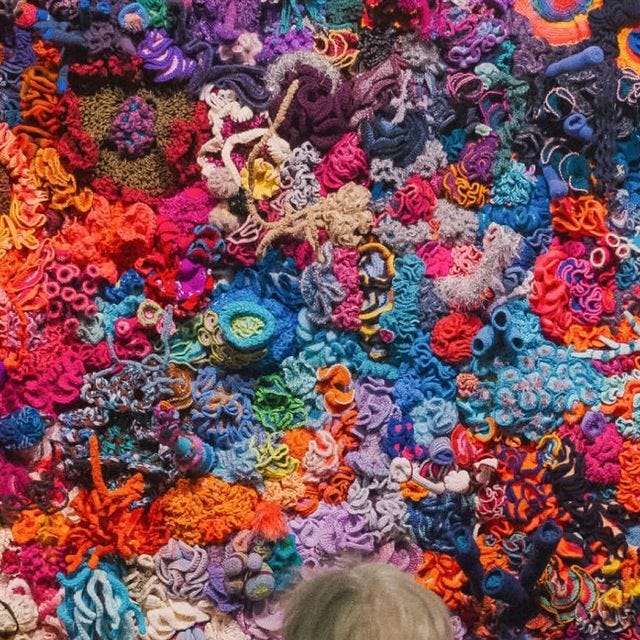Making Math
On going viral at the NYTimes and the value of hand-making ideas
The New York Times article about my Crochet Coral Reef project has gone viral.
An #instagram post on the Times feed has accrued nearly 200,000 likes. That’s more likes than for the Emmys Red Carpet! More than for any Times post in the past month except one about Barbie at the Oscars and a pair on Taylor Swift at the Grammys. This is for a piece about math!
Well – math and art and climate change.
People the world over are loving the project’s nexus of art, craft and STEM. It’s proof of the power of radically-conceived science communication – and the need for more.
The Crochet Reef is one of the rare science outreach projects aimed at women. To date 25,000 (mostly female) participants have been involved in 52 cities and counties worldwide. This is now the largest art+science endeavor on the planet, with millions of visitors to our shows exposed to the foundations of non-Euclidean geometry and the subject of global warming.
The work has been shown at the Venice Biennale, the world’s premier art event, and in a solo exhibition at the Smithsonian’s National Museum of Natural History, our premier science museum, making for a unique conjunction. I know of no other project to achieve this duality.
UPDATE: On 02/11/2024 the Times instagram post hit 200,000 likes. And still climbing.
Yet every science funder I’ve approached for support has said “No! Don’t bother to put in an application.” One major funder told me he wouldn't even consider it, because (I quote) he “didn’t believe there was any real science in a bunch of women knitting!”
The science world abounds with rhetoric about the need to engage women and girls with STEM, yet funding streams remain tied to academic institutions doing things in the usual authorized ways.
At the National Science Foundation I was told I’d have more chance of getting a grant – or being allowed to apply for one – if instead of teaching women to crochet models of hyperbolic geometry, I developed a computer program to simulate the forms in CGI. Rather than having people construct models in their hands, feeling their way into the landscape of non-Euclidean math, audiences would tweak a few numbers on a screen and see the shapes appear as computer-generated sims.
In the minds of the NSF program officers handicraft had no validity as a tool for mathematical pedagogy. But, hey, if the method involved microchips it would ipso facto be legit.
Symbols and codes are powerful tools and I don’t deny their validity, but material things also embody deep conceptual ideas.
Such bias against material play and embodied cognition is a serious prejudice preventing science funders, and many others too, from pursuing paths of math and science engagement that could appeal to millions.
The militant insistence that only symbolic methods of teaching STEM are legitimate is an extension of the ideology that scientific and mathematical knowledge is reducible solely to symbols and codes. Symbols and codes are powerful tools and I don’t deny their validity, however material things also embody conceptual ideas, and for the vast majority of people, who aren’t going to be professional mathematicians or scientists, physical learning tools can convey so much while also evoking pleasure.
At a time when mathematical and scientific literacy is so wanting in our society, the unprecedented success of the Crochet Coral Reef project has shown how people are hungering for accessible ways into these subjects.
For women, who constitute a vast underserved audience for science communication, the opportunity to be engaged with ideas at the foundations of geometry and cosmology, while practicing a craft many associate with their mothers or grandmothers, is not only a joy, it’s empowering: “Yes I can crochet a doilie; but look I can also craft a shape that may emulate the structure of spacetime.”
As fingers fly across strands of yarn, lights go on intellectively and making opens doors of cognition.
*
Thanks to Siobhan Roberts for writing such an elegant piece for the Times.
The Crochet Coral Reef is currently on exhibition at Schlossmuseum Linz in Austria.
See here for my Crochet Reef TED Talk.
*
UPDATE: On 02/11/2024 the NYTimes insta-post hit 200,000 likes - and is still climbing.
*



